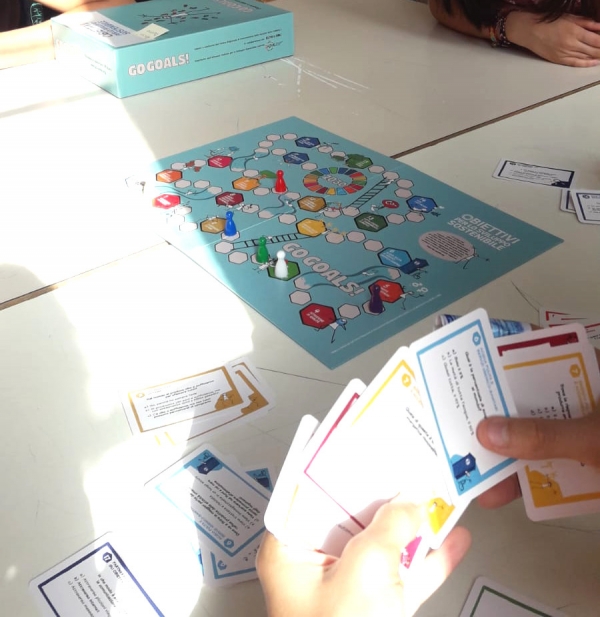Mrs. Chiara Loasses teaches Literature, History and Geography, while her colleague Mrs. Francesca Devoto teaches Maths and Science. Both work at the Belli Lower Secondary School of Rome and decided to work together to bring the Teaching and Learning Unit on international inequalities in their classroom. Such work has been possible thanks to their Institute’s collaboration with CISP, which allowed the two teachers to complete training courses on various subjects and provide new lessons to their students.
We thank Mrs. Loasses for being so kind to share her thoughts with us on the following short interview, gathered at the end of the school year.
 |
Mrs. Chiara Loasses |
Why did you choose International inequalities?
Together with my colleague, Mrs. Devoto, we decided upon international inequalities as we could do it together with the only students we share. We thought such a subject could be good for that particular classroom. Also, we wanted a more unconventional subject.
How have you decided to work together?
Mrs. Devoto has been teaching in this school longer than me. When I arrived, she immediately asked me to collaborate, so we met even before the beginning of the school year.
Our collaboration has started really soon. One might think Literature and Maths don’t usually go together but we have found a way to cooperate along three whole years.
So, your collaboration is a personal choice, not a Class Council choice, correct?
Firstly, we decided to work together, and then we notified our decision to the Class Council, which ratified it as part of the teaching approach for that classroom.
We found so many common grounds among our subjects, especially between Maths and Geography. For instance, while talking about some countries I need to introduce graphics, statistics, math indexes…
What are the most interesting results so far? What was the students’ reaction?
I think I had the most powerful confirmation at the final exams when the students’ majority chose to talk about Agenda 2030 and SDGs. Seeing their motivation and involvement I get that they had been struck by the subjects we talked about. I think it’s because, in the end, we talked about themselves, current events, their future and their active role in the world. They felt the empowerment of being able to do something, to exit the classroom and being listened to. They felt important, involved.
Any funny moments you wish to recall?
The chair game (more info here), that is one of the TLU’s activities.
At some point, the students had to split into groups, and all of them wanted to be part of the Europe group. Africa only had one chair, so 5 or 6 students were sitting on top of each other, on that single chair. In Europe, there were few students and they started laying down to occupy more than one chair each.
And then we discussed. What does it mean sitting all together in one single chair? And occupying more than one chair, even if you don’t need it?
All of them took part in the discussion. That’s because they could see what had happened, they had been sitting uncomfortably or tried to take everything they could. It was really interesting.
Another day we used the “I agree/I disagree” signals to discuss some of the international inequality issues, like the availability and consumption of resources. In this case, the questions were a bit more difficult and in the end, I thought the activity had been unsuccessful. Only a few students participated in the discussion, some of them could not understand the ultimate meaning of what we were talking about, many remained silent all the time. But eventually, I learnt that such activity was interesting for all of them, as it was a challenge. Even the ones who actually did not participate said they found it interesting and stimulating.
I was told you invented the “dado baro”, what is it?
‘Dado baro’ (cheater die, ed. download your instructions, in English) was invented by Mrs. Devoto, my colleague. The activity is called “Birth is a serious matter” and its goal was letting students understand what difference it makes, in terms of opportunities, being born in a country or another. We designed this dice with places of the globe on each face, but it’s a cheater die as a little weight is attached inside one of its faces, therefore not all faces have the same chance: it’s easier to being born in a poor and densely populated country. Then, we looked at the Passport Index and learnt how different passports allow you to travel in a wide or little number of other countries.
Together with the Maths teacher, the students created the die, studied all metrics and statistics, etc. With me they learnt the differences in the life of a person born in a country or another, starting from those metrics.
In the end, we asked them to create a text, video, audio, or draw to image and reflect upon the life of a person born somewhere else. After seeing all the works, students themselves picked one of them to participate in a national competition.
They voted for a double-interview in which each student impersonated a South-African man, one from a wealthy background, and the other from a poor one.
Any other interesting moments?
Last school day we played Go Goals. The students liked it a lot.
I made groups and gave them the game with no instructions whatsoever, so some of them took the time to read the rules, while others learnt on-the-go. Some asked me if they could change the rules and I said they had to decide among themselves. So, they proposed the change, discussed it, and eventually voted against it! Yet, it still was a way to discuss and learn different points of view.




